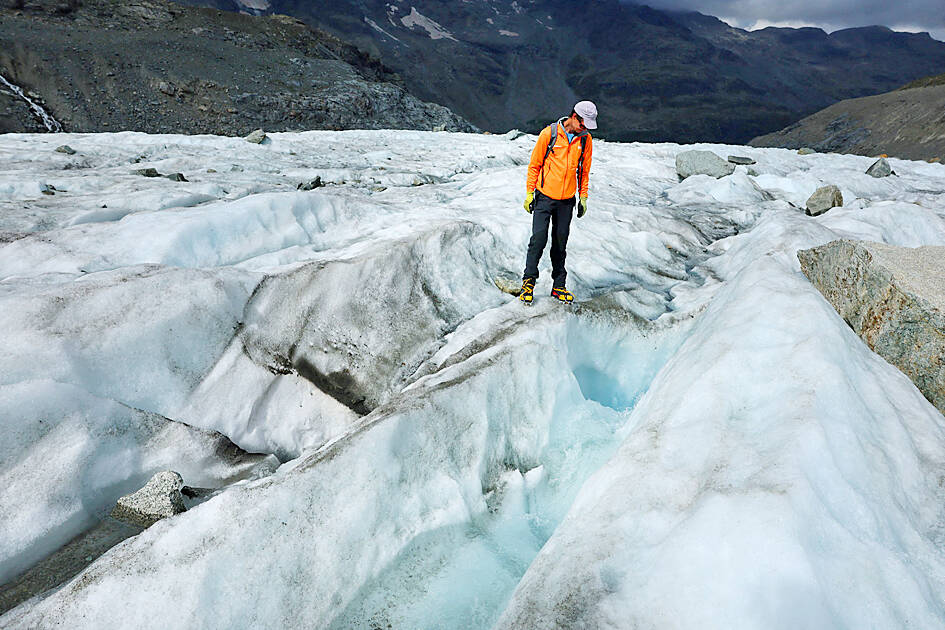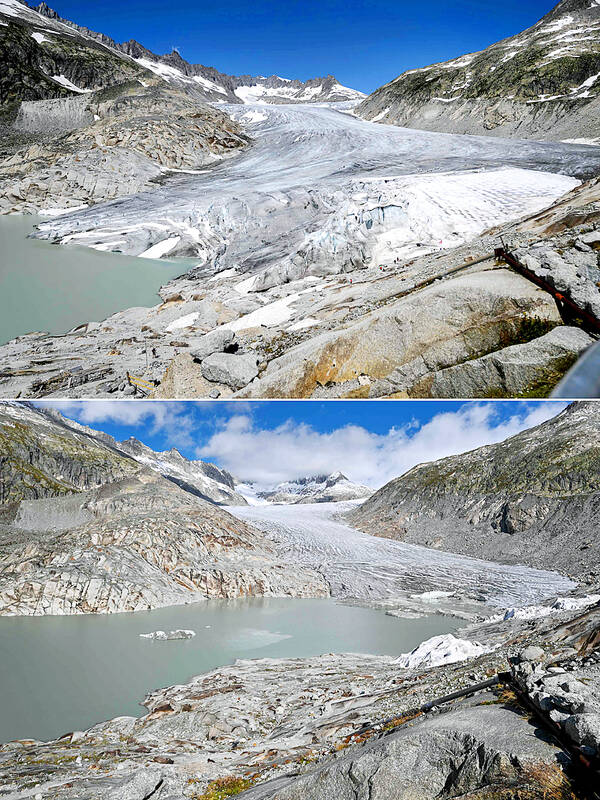A snowy winter provided no respite for Switzerland’s glaciers, which shed 2.4 percent of their volume in a year, with Sahara sand accelerating the summer melt.
The past 12 months have been “exceptional both in terms of accumulation and melt” for Swiss glaciers, a Glacier Monitoring in Switzerland (GLAMOS) study showed yesterday.
In the end, the glacier melt, which scientists say is being accelerated by human-induced climate change, was less dramatic this year than over the previous two years, when Swiss glaciers lost more than 10 percent of their volume — a record.

Photo: Reuters
When disregarding 2022, when 5.9 percent of ice volume in the Swiss Alps was lost, and last year, when another 4.4 percent melted away, the annual volume loss in recent decades has fluctuated between 1 and 3 percent.
The 2.4 percent glacier shrinkage this year was well above the 1.9 percent annual average from 2010 to 2020.
It amounted to a “massive loss of ice again,” GLAMOS head Matthias Huss said.

Photo: AFP
The glaciers “are retreating faster and faster” and “are on track to disappear,” he said.
“They will only be there in 100 years if we manage to stabilize the climate,” he added.
GLAMOS researchers did extensive measurements at 20 glaciers last month, and extrapolated the findings to Switzerland’s 1,400 glaciers.
It determined that Swiss glacier volume would total 46.4 cubic kilometers at the end of this year — nearly 30 cubic kilometers less than in 2000.
The ice loss in 2024 was especially “considerable ... given the strongly above-average snow coverage at the end of winter,” the study said.
Up until June, Swiss glaciers benefitted from winter snowfall 30 percent above average and a rainy start to the summer.
“I hoped for a better result for 2024, especially after this snow-rich winter and the good situation we had into June,” Huss said.
Now, he said he was “disappointed,” but “not too surprised.”
“We are living in a time with rapid climate change, and glaciers are just not able to keep up with the speed the climate is warming,” he said.
“Under the present climate situation ... it’s not possible to stabilize glaciers, even with an optimal winter,” he said.
The study said “very high” temperatures in July and August, coupled with a lack of fresh high-altitude snowfall helped drive “the significant glacier mass losses.”
August was particularly hot, and that month actually saw record-high glacier mass losses, GLAMOS said.
The third crucial factor was the fact that winds during the winter and spring this year repeatedly brought “substantial amounts of Saharan dust into the Alps,” he said.
The contaminated snow absorbed more heat and melted faster, more quickly depriving the glaciers of their protective snow coating.
While GLAMOS researchers have yet to quantify the net effect of the Saharan dust on the this year’s ice loss, the study said “an increase in melt rates of 10 to 20 percent compared to normal conditions appears plausible.”
The glacier melt is having far-reaching impacts.
Switzerland and Italy have adjusted their mountain border under the Matterhorn peak after the glaciers that historically marked the frontier receded. And with less ice, far less melt water is reaching downstream areas in the summer when it is needed, GLAMOS said.
This it warned could “pose important challenges for the future management of water resources ... especially during drought periods,” it said.
Huss stressed the urgent need to rein in climate change. The UN has warned that the world remains far off track to meet the 2015 Paris climate accord goals, aiming to keep global temperature rises below 1.5 degrees Celsius above pre-industrial levels.
However, Huss fears that with the world wracked by multiple conflicts and crises, decisionmakers are not giving climate action appropriate attention.
The glaciers “are just illustrating every year again that there is an urgent need to act now -- and not in one or two or three decades,” he said.

POLITICAL PRISONERS VS DEPORTEES: Venezuela’s prosecutor’s office slammed the call by El Salvador’s leader, accusing him of crimes against humanity Salvadoran President Nayib Bukele on Sunday proposed carrying out a prisoner swap with Venezuela, suggesting he would exchange Venezuelan deportees from the US his government has kept imprisoned for what he called “political prisoners” in Venezuela. In a post on X, directed at Venezuelan President Nicolas Maduro, Bukele listed off a number of family members of high-level opposition figures in Venezuela, journalists and activists detained during the South American government’s electoral crackdown last year. “The only reason they are imprisoned is for having opposed you and your electoral fraud,” he wrote to Maduro. “However, I want to propose a humanitarian agreement that

ECONOMIC WORRIES: The ruling PAP faces voters amid concerns that the city-state faces the possibility of a recession and job losses amid Washington’s tariffs Singapore yesterday finalized contestants for its general election on Saturday next week, with the ruling People’s Action Party (PAP) fielding 32 new candidates in the biggest refresh of the party that has ruled the city-state since independence in 1965. The move follows a pledge by Singaporean Prime Minister Lawrence Wong (黃循財), who took office last year and assumed the PAP leadership, to “bring in new blood, new ideas and new energy” to steer the country of 6 million people. His latest shake-up beats that of predecessors Lee Hsien Loong (李顯龍) and Goh Chok Tong (吳作棟), who replaced 24 and 11 politicians respectively

Young women standing idly around a park in Tokyo’s west suggest that a giant statue of Godzilla is not the only attraction for a record number of foreign tourists. Their faces lit by the cold glow of their phones, the women lining Okubo Park are evidence that sex tourism has developed as a dark flipside to the bustling Kabukicho nightlife district. Increasing numbers of foreign men are flocking to the area after seeing videos on social media. One of the women said that the area near Kabukicho, where Godzilla rumbles and belches smoke atop a cinema, has become a “real

‘WATER WARFARE’: A Pakistani official called India’s suspension of a 65-year-old treaty on the sharing of waters from the Indus River ‘a cowardly, illegal move’ Pakistan yesterday canceled visas for Indian nationals, closed its airspace for all Indian-owned or operated airlines, and suspended all trade with India, including to and from any third country. The retaliatory measures follow India’s decision to suspend visas for Pakistani nationals in the aftermath of a deadly attack by shooters in Kashmir that killed 26 people, mostly tourists. The rare attack on civilians shocked and outraged India and prompted calls for action against their country’s archenemy, Pakistan. New Delhi did not publicly produce evidence connecting the attack to its neighbor, but said it had “cross-border” links to Pakistan. Pakistan denied any connection to